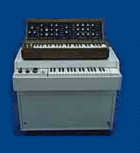






































|
After Dinner - Paradise of Replica
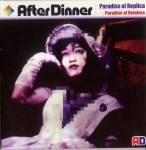
Click on the album cover to hear a
RealAudio sample.
Comments:
After Dinner was a unique 80s Japanese group led by female singer/composer Haco, who released about a half-dozen albums before calling it quits. Paradise of Replica, released in 1989, is an impressive album that unfortunately went, and stayed, out-of-print for close to 10 years. Haco decided to reissue a remastered version of the original album, and also include additional remixed tracks(20+ minutes). What is so unique about this band is they naturally combined Japanese melodies with western influences(new wave, indie, classical) to create an eccentric form of chamber avant-pop that focused on the Haco's girl-ish vocals. The album lists over 20-instruments which include everything from guitar/bass/piano/drums to violin, cello, harp, harpsichord, various Japanese instruments, and even volleyballs(used for some rhythms), and many of the instruments seem to have been cut-up and manipulated electronically to create new sounds and textures(Haco studied with Fred Frith). The music is avant-garde, yet friendly enough to impress someone only into pop music. Did I mention that this 1989 recording sounds as fresh today as it did 13 years ago? No? Well, it sounds like alot of modern bands are trying to go for these sort of sounds these days. Paradise of Replica is simply a gem.
Compositions: 9/10
Vocals(Japanese, and some English): 9/10
Recording Quality: 10/10
Ars Nova - Goddess Of Darkness

Click on the album cover to hear a
RealAudio sample.
Comments:
Ars Nova are an all-female trio from Japan. I was introduction to their music at
the 1995 Progfest in Los Angeles, and I left that night impressed with the band. Not only
have the three musicians mastered their respective instruments, but the keyboardist's
compositional skills are impressive. Goddess Of Darkness is considered one of Ars Nova's strongest album to date. Obvious influences include ELP, Il
Balleto Di Bronzo, and Goblin. The keyboard-based music is quite intense and in-your-face, and it tends to feature a sound that is uniquely Japanese in nature. Their bassist, who unfortunately quit the band a couple of years ago, is impressive here. She plays complex lines, on a Rickenbacker bass, that would blow-away most Chris Squire fans.
Along with Marc Miller, bassist of Yezda Urfa, I'm surprised that she hasn't
been mentioned in the bass community. Overall, this is recommended to fans of intense keyboard-based prog.
Kenso - In The West
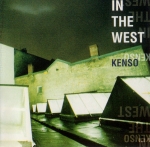
Comments:
Along with about a thousand other prog fans, I was very fortunate to see these guys play live at the Progfest 2000 festival. Kenso put on one of the most intense, and tight performances I've ever seen live, and although I was completely unfamiliar with their music before that night, the combination of complex fusion-esque guitar work, dual keyboards, Japanese melodies, Area-like bass work, and a drummer who used his kit like a war machine won us newbies over in a matter of 10-minutes. The band got standing ovations after every composition 15-minutes into their set! In The West is a 1997 live release from a show at the On Air West club in Tokyo, and although their set back then wasn't as smoking as the one at Progfest 2000, they still put on a great show. Their music falls somewhere between fusion and symphonic progressive rock. Try to imagine Iceberg mixed with an instrumental Locanda Delle Fate. The leader of the band, Yoshihisa Shimizu, is gifted both as a guitarist and a composer. He enjoys creating compositions that alternate between heavy fusion and melodic symphonic prog, and he has an incredible talent for creating memorable riffs, and hooks. Many of his guitar melodies, and compositional themes, are based on Japanese scales, which is unique to hear in the world of fusion. Do yourself a favor and check out Kenso. In The West is a perfect place to start.
KoenjiHyakkei - NIVRAYM
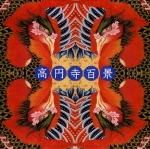
Click on the album cover to hear a
RealAudio sample.
Comments:
Shit, this is a CD that grabs you by the balls and doesn't let go. For those of you who are not familiar with these guys, KoenjiHyakkei is the Zeuhl-obsessed side-project from Ruins drummer Tatsuya Yoshida. His main source of inspiration is the French group Magma, but Tatsuya takes those Magma influences to the edges of insanity. Add to that the frenzied bass and synth work from France's Eskaton, and the vocal weirdness from Italy's Area, and you're in for some crazed prog rock. The energy level throughout the CD doesn't slow down for a minute as you ears get blasted by Kobaian-like chanting, sections galore of maniac yet cartoonish guitar/synth/bass work, and rhythms that change almost every 4-8 measures. The second track "Becttem Pollt" has got to be one of the best prog rock compositions of the past decade. The instrumental section in the middle is so intense, and proggy, that you might even have to stop the CD to catch your breath. The one problem that I had with the last KoenjiHyakkei album, Viva Koenji!, was that, after the first track, the rest of the music really wasn't that memorable. Well, NIVRAYM, I'm happy to report, is not only more complex than its predecessor but is catchy from beginning to end. I can't find a weak track here. Overall, if you're into RIO, Zeuhl, avant-garde prog you definitely have to check this CD out.
Lacrymosa - Joy Of The Wrecked Ship
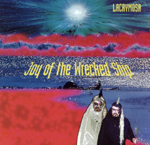
Click on the album cover to hear a
RealAudio sample.
Comments:
I would classify Lacrymosa as a RIO band. There is a strong 20th-century
classical influence(Schoenberg's 12-tone, Bartok's rhythms, etc).
They seemed to have also been influenced by bands like Henry Cow, and Univers
Zero. Every composition on this album features an assortment of classical instruments(violins, glockenspiels,
guitar, piano, harpischord, etc), and the electric bass seems to lead the other musicians through the multiple sections.
Unlike most Rock-In-Opposition bands, Lacrymosa are much easier to digest. They not only keep the avant-garde, and improvised, noise down to a minimum, but are also great at creating memorable hooks out of the complex interaction(similar to Henry Cow's Legend). I would recommend Joy Of The Wrecked Ship as a good introduction to avant-garde prog/RIO.
Compositions: 9.5/10
Vocals(none): N/A
Recording Quality: 9.5/10
Noism - Demo Promo
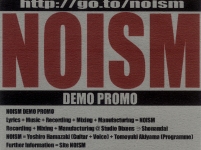
Comments:
I first heard about this Japanese, death-metal based, duo on an avant-garde message board
while messing around the internet. Their musical philosophy sounded so interesting that I
quickly started my search for their demo(released a few months after they formed the band).
Basically, according to guitarist Yoshiro Hamazaki, his vision of 21st century music is one
of hyper-complexity, and brutality(assaulting the senses). To achieve this, a typical Noism
composition features very fast tempos and "blasts", where the beats-per-minute(bpm) either speed up or slow down every measure
(ex, the bpm might jump from 200, to 210, 220, 240, then to 110, 100, 90, 80, then back to 250 in a matter of seconds). The compositions each feature over one-hundred guitar riffs, and little to no repetition. The music is influenced
by traditional death-metal, meaning that it's influenced by a tradition of complex, fast,
and brutal sound. But Noism have gone beyond typical death-metal to create a genre of their own.
The music is built using guitar, programmed drums(because a human drummer could never play this complex music),
and vocals. As I mentioned, the guitar-playing is unbelievable. It is of such complexity, that the listener
is left wondering how anyone could play like that. The programmed drums sound excellent. They don't
sound like a drum-machine because of the amount of variation, yet give the music a certain
"drum n' bass" influence. The vocals are influenced by the death-metal school, and might be
the hardest part of Noism to enjoy. They are heavily processed, and sound more like grunts and
moans. Fortunately, the demo comes with karaoke versions of 3 of the tracks for people who
are into instrumentals. Along with the demo CD, I received a tape with a few new tracks by the band. And just
when I thought that their music couldn't get more complex, they have already surpassed the
tracks on the demo CD. This is a band to look out for if you're looking for something new and
hyper-complex. The music will mostly appeal to avant-garde,
rock-in-opposition(RIO)(fans of bands on Cuneiform), complex-metal fans, and fans of Germany's Necrophagist. Noism are on their
way to create a new genre of music.
Webpage:
Noism
Noism - Brutal Autonomy
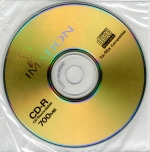
Comments:
Brutal Autonomy is the 2nd official release by Noism. These guys started off influenced by the death-metal scene, but soon kept two ingredients of that genre while getting rid of all of the "death" bullshit. Their obsession quickly became the pursuit of complexity and brutality in music. A Noism composition is usually short(not more than 3-minutes). Each track features up to 100 guitar-riffs, and little-to-no repetition. The tempos quickly go from fast, to half-time, to super-fast in a matter of seconds. They also enjoy the use of "blasts", where the tempos quickly pick up speed every measure(almost like turning a speed knob on a digital workstation). The result is a musical assault on your brain. And, if you love complex metal, this is absolute genius. Guitarist Yoshiro Hamazaki is one of the sickest guitarists I've ever heard. On Brutal Autonomy his playing could easily fit within the avant-garde guitar category. Not only does he play some of the fastest guitar I've heard, but he effortlessly gets his guitar to spit out all sorts of squeeks and noises that fit perfectly with the rhythmic onslaught. Tomoyuki Akiyama's drum samples sound great. His programming is precise, and, because of the constant change in the music, the drums easily have as much variation as the guitar riffs.
Overall, I love this stuff, but have to mention that it isn't for everyone. If you are into the avant-garde, complex-metal, and bands like Ruins or Necrophagist these guys are worth checking out.
Website
Noism
Polysics - Hey! Bob! My Friend!
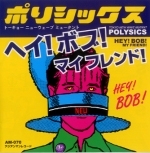
Click on the album cover to hear a
RealAudio sample.
Comments:
Polysics are without a doubt one of the coolest modern Japanese band around. This trio of guitar, keyboards(bass synth included), and drums started in 1998 offering an addictive mix of Devo and Suburban Lawns-like No Wave, jerky distorted guitar work, video game music, mixed with a stong dose of punk rock energy. They freely list bands like Neu!, Brian Eno, and Devo as influences(heck, the album cover even looks a bit like Frank Zappa's Weasel Ripped My Flesh), but what you get is totally unique compared to 99% of the bands out there. Hey! Bob! My Friend!, apparently collects two different EPs into one CD-length album. The novice listener will instantly notice the odd-ball synth work on most of the tracks that really makes this band stand out. New Wave, Devo, 80s video game music, and even techno(without sounding like techno) comes to mind when listening to the "bleep bloop" synths melodies, argeggios, and sound effects. But, believe me, this is some of the craziest 80s-influenced synth work that I've run into. The energy level, and ingenuity is uniquely Japanese, and even similar to the latest KoenjiHyakkei. Along with the synth work, most listeners will notice the guitar work throughout the CD. I was reminded of a mixture of punk, and avant-garde that easily brings fellow Japanese band Ruins to mind(but Polysics are more cartoon-like). Most of the compositions feature enough twists and turns to rival even the most adventurous prog album. Overall, this Tokyo New Wave Mutant band will impress most prog collectors.
Tipographica - God Says I Can't Dance
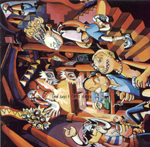
Comments:
Tipographica are very hard to describe, which is probably why they were one of the
most interesting band of the 90s(unfortunately, the band recently decided to part
ways). The musicians, consisting of guitarist, bassist, drummer, and a small horn section seemed influenced by Frank Zappa's 70s jazz compositions, and
especially Ruth Underwood's crazed percussion work-outs. However, the rhythms on God Says I Can't Dance are really unique, and don't seem directly influenced by Zappa. I've heard their unique rhythm work being called "arhythmic"(tons of starts, stops, 90 degree turns, tempo changes). Yes, you could definitely say that. But the band is great at creating grooves out of those irregular rhythms, giving the music a strange danceable quality to it(like Zappa's catchiest work). The interaction between musicians has a playfulness to it that is typical of most of the experimental Japanese bands. Tipographica are a perfect introduction to the Japanese prog scene.
Compositions: 10/10
Vocals(none): N/A
Recording Quality: 10/10
|
